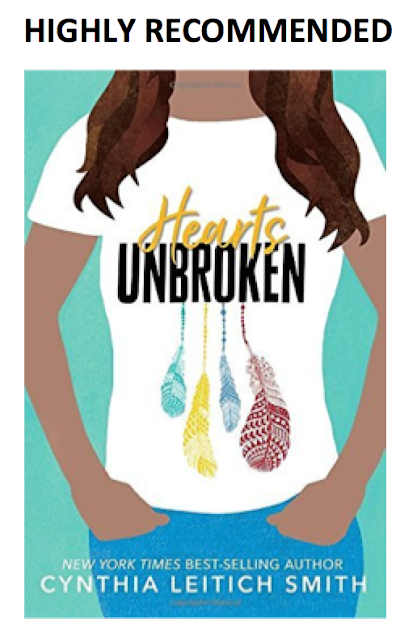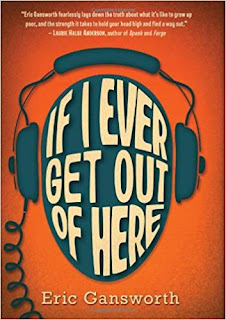Most regular readers of this blog won’t need to be convinced
that it takes more than one story about a group of people to adequately portray
that group’s experience. Still, we know that in classrooms and in library
collections across North America, the pickings are usually slim when it comes
to books by and about Native people. So “the danger of a single
story” Chimamanda Ngozi Adichie warns about is very real.
Right now I’m revisiting that point -- yet again -- via two
recently published books with contemporary Native teen girl protagonists. Dawn Quigley’s (Turtle Mountain Chippewa) debut novel Apple in the Middle (2018) is set in Minnesota and the Turtle Mountain
Chippewa reservation in North Dakota. The protagonist, Apple, meets her Native family members for the first time, the summer after her sophomore year in high school.
Katherena Vermette’s A Girl Called Echo: Pemmican Wars (2017) is a graphic novel. Echo, the main character, is 13 years old. She is Metis, as is Vermette. The story is set in Winnipeg, Manitoba.
Katherena Vermette’s A Girl Called Echo: Pemmican Wars (2017) is a graphic novel. Echo, the main character, is 13 years old. She is Metis, as is Vermette. The story is set in Winnipeg, Manitoba.
Apple’s mother, who was Turtle Mountain Chippewa, died after
giving birth to her. Apple grew up with her dad and stepmother (both
white), in their upper middle class suburban world, where she feels like
she never quite fits. She carries a sense of guilt for her mother’s death. She’s
a bit prickly, and more than a bit socially awkward. Since an incident of open racism during grade school, she has tried to look as white as possible. Her
father’s reluctance to tell her about her Native family hasn’t
helped. As a narrator, Apple has a lot to say. She can be rude, impulsive, and loud, with a biting sense of humor, but she begins to dial it all down somewhat as she gets to know her Turtle Mountain relatives.
Of her sense of not fitting in, Apple says, “I call it the Ping-Pong effect
because you’re the ball, and nobody ever wants you in their space. Have you
ever felt like that? Never really belonging anywhere, but trying your darndest
to run between two lives only to find you’re always stuck in the middle.”
Apple
may feel that she's constantly running, but Echo’s days in Pemmican Wars seem to involve just putting one foot in front of the other, with tremendous effort.
Unlike Apple, Echo is nearly silent. She’s emotionally
isolated at school and in her foster placement, and moves as if something is
draining all her energy. She spends most of her time with her earbuds in: Guns
n Roses, Red Hot Chili Peppers. The only time we see anything like a
smile on her face is when she finds some graphic novels about Metis history on a
library shelf. She’s in a new school and knows nobody, though her history
teacher seems to “see” her. When she falls asleep, she dreams
herself into events from First Nations history,
and it’s in those dreams that she seems to feel most alive -- and where she has a friend.
Her mother stays in some kind of
institution – rehab or mental health facility, maybe – which hints at why Echo
is in foster care. Echo opens up slightly when she visits her mom. She speaks, asks
questions about their family's Metis background, tells her mom
what she is learning. The history class, the dreaming, and her relationship
with her mom may be what eventually help her find her place. (That's "eventually" because Echo doesn’t find resolution in Pemmican
Wars. Vermette’s second Echo book is due out in December, and we can hope that things will be looking up for her protagonist.)
The changes Apple and Echo go through in their respective
stories are very different from each other, though both characters move toward a
stronger sense of who they are, and what being Indigenous means (or can
mean) to them, as they deal with racism, school, family issues, and so on.
Three brand-new, strong Indigenous female teen main characters -- now there's a gift for your students, your teen patrons, your children, and your grandchildren!
(Recognition is due Katherena Vermette’s collaborators on Echo – illustrator Scott B. Henderson
and color artist Donovan Yaciuk. Because Echo speaks so seldom, it’s on the
illustrations to convey key details about her life. And they do so with subtlety and grace! For example, the letters WPG on the front of a bus Echo rides signal that she's in Winnipeg. Or so I'm told.)
--Jean Mendoza
UPDATE 10/29/19: Last week, @debraj1121 commented on Twitter that although she liked Apple in the Middle, she was concerned about negative mentions of "voodoo." One of Apple's distorted ideas about Native people is that they practice what she thinks of as voodoo, which evidently both intrigues and frightens her. Apple's grandmother pushes back on that mistake, calling voodoo "nonsense" and enlightening Apple about their family's actual beliefs.
Reading the Twitter conversation that followed, I realized 1) how much I need to learn, and 2) it's important to make a statement here about how voodoo appears in Apple in the Middle.
Voodoo is widely misunderstood in mainstream Western culture, and is portrayed in horror films and the like, as a kind of magic that can be used to hurt someone or cause chaos. It's often racialized (practitioners shown as African, Afro-Caribbean, or African-American, and scary). Popular (mis) representations reveal little if anything about the actual cosmology, a complex belief system with origins in Africa. It probably had a powerful role in sustaining many people who were enslaved and brought to the continents currently called the Americas. It has many believers in Haiti and elsewhere, and is more correctly called Vodou or Voudon.
I was dismayed to realize that, focused as I was on Apple's ignorance about Native people, I had scarcely noticed the mention of voodoo in the book. @debraj1121's tweet got me started looking into what "voodoo" really is. Beyond the very general statements above, I can't be a reliable source of information; still building a sense of what's trustworthy. One scholarly exploration that I'm finding helpful is "Haitian Vodou and Voodoo: Imagined Religion and Popular Culture" by Adam M. McGee, which focuses not on the actual religion but on how it has been sensationalized in the mainly-White popular imagination.
Anyway, part of Apple's growth as a character involves putting aside misunderstandings about Native people. Authors often do that by having events or other characters interfere with the character's ignorance or mistaken ideas. Apple's grandmother's contradiction (voodoo is "nonsense") falls short.
Author Dawn Quigley has said on Twitter that she honors and values @debraj1121's insights, and has contacted the publisher of Apple in the Middle about the problem.
If you've read or shared Apple in the Middle, recognize that voodoo is a real religion and that in the Western imagination it has been heavily colonized by powerful and persistent misrepresentations in films, stories, etc.
Also on 10/29/19 -- A large and growing number of previously-White-identified people in eastern Canada have begun coopting First Nations identity by being spuriously designated "Eastern Metis." (For more information, see Darryl Leroux's book Distorted Descent: White Claims to Indigenous Identity, and his Web site Raceshifting.) We want to note that A Girl Called Echo author Katherena Vermette and her character Echo are of the Metis nation in Manitoba, not the pretender group.
UPDATE 10/29/19: Last week, @debraj1121 commented on Twitter that although she liked Apple in the Middle, she was concerned about negative mentions of "voodoo." One of Apple's distorted ideas about Native people is that they practice what she thinks of as voodoo, which evidently both intrigues and frightens her. Apple's grandmother pushes back on that mistake, calling voodoo "nonsense" and enlightening Apple about their family's actual beliefs.
Reading the Twitter conversation that followed, I realized 1) how much I need to learn, and 2) it's important to make a statement here about how voodoo appears in Apple in the Middle.
Voodoo is widely misunderstood in mainstream Western culture, and is portrayed in horror films and the like, as a kind of magic that can be used to hurt someone or cause chaos. It's often racialized (practitioners shown as African, Afro-Caribbean, or African-American, and scary). Popular (mis) representations reveal little if anything about the actual cosmology, a complex belief system with origins in Africa. It probably had a powerful role in sustaining many people who were enslaved and brought to the continents currently called the Americas. It has many believers in Haiti and elsewhere, and is more correctly called Vodou or Voudon.
I was dismayed to realize that, focused as I was on Apple's ignorance about Native people, I had scarcely noticed the mention of voodoo in the book. @debraj1121's tweet got me started looking into what "voodoo" really is. Beyond the very general statements above, I can't be a reliable source of information; still building a sense of what's trustworthy. One scholarly exploration that I'm finding helpful is "Haitian Vodou and Voodoo: Imagined Religion and Popular Culture" by Adam M. McGee, which focuses not on the actual religion but on how it has been sensationalized in the mainly-White popular imagination.
Anyway, part of Apple's growth as a character involves putting aside misunderstandings about Native people. Authors often do that by having events or other characters interfere with the character's ignorance or mistaken ideas. Apple's grandmother's contradiction (voodoo is "nonsense") falls short.
Author Dawn Quigley has said on Twitter that she honors and values @debraj1121's insights, and has contacted the publisher of Apple in the Middle about the problem.
If you've read or shared Apple in the Middle, recognize that voodoo is a real religion and that in the Western imagination it has been heavily colonized by powerful and persistent misrepresentations in films, stories, etc.
Also on 10/29/19 -- A large and growing number of previously-White-identified people in eastern Canada have begun coopting First Nations identity by being spuriously designated "Eastern Metis." (For more information, see Darryl Leroux's book Distorted Descent: White Claims to Indigenous Identity, and his Web site Raceshifting.) We want to note that A Girl Called Echo author Katherena Vermette and her character Echo are of the Metis nation in Manitoba, not the pretender group.





